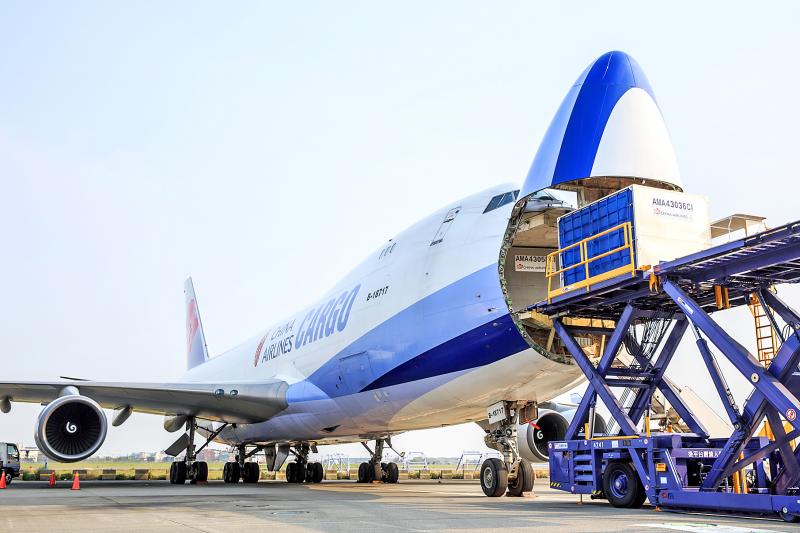China Airlines Ltd (CAL, 中華航空) yesterday reported record revenue of NT$16.92 billion (US$611.54 million) for last month, up 63.41 percent from a year earlier, aided by record cargo revenue of NT$15.43 billion amid the peak travel season, the airline said.
Cargo revenue was up 9.49 percent month-on-month and 71.39 percent year-on-year, the airline said.
“Demand for air shipping remained strong last month, leading to high freight rates and a high load-factor. It was the fifth consecutive month that our cargo revenue surpassed NT$10 billion since August,” it said in a statement.

Photo courtesy of China Airlines Ltd
The airline holds an upbeat outlook for the air cargo business in the first quarter, expecting demand to exceed supply, as congestion in sea ports worldwide remains severe and would not be solved in the short term, prompting companies to consider shipping their products by air, it said in the statement.
Such goods include semiconductor components, automobile components, consumer electronics and parcels from e-commerce platforms, it said.
Demand for shipping anti-virus devices and equipment is likely to rise in the first quarter, as many countries experience a surge in cases amid the spread of the Omicron variant of SARS-CoV-2, the airline added.
“While the demand for shipping goods to China and Hong Kong might cool during the Lunar New Year holiday, we plan to offset the effects by redirecting our focus to the Southeast Asian markets in that period,” CAL said.
The airline’s revenue from passenger services was NT$589 million last month, up 17.91 percent from November last year as the number of Taiwanese living abroad returning home before the Lunar New Year increased, it said.
Cumulative sales grew 20.25 percent to NT$138 billion last year, company data showed.
Rival EVA Airways Corp (長榮航空) yesterday reported annual revenue growth of 71 percent to NT$12.37 billion for last month, the highest since the outbreak of the COVID-19 pandemic, it said.
Its cargo revenue reached a record NT$10.99 billion last month, up 86 percent year-on-year, on the back of rising capacity after obtaining three new cargo jets.
EVA’s cumulative revenue for last year was NT$103.87 billion, up 16.65 percent from a year earlier, company data showed.

Three experts in the high technology industry have said that US President Donald Trump’s pledge to impose higher tariffs on Taiwanese semiconductors is part of an effort to force Taiwan Semiconductor Manufacturing Co (TSMC, 台積電) to the negotiating table. In a speech to Republicans on Jan. 27, Trump said he intends to impose tariffs on Taiwan to bring chip production to the US. “The incentive is going to be they’re not going to want to pay a 25, 50 or even a 100 percent tax,” he said. Darson Chiu (邱達生), an economics professor at Taichung-based Tunghai University and director-general of

‘LEGACY CHIPS’: Chinese companies have dramatically increased mature chip production capacity, but the West’s drive for secure supply chains offers a lifeline for Taiwan When Powerchip Technology Corp (力晶科技) entered a deal with the eastern Chinese city of Hefei in 2015 to set up a new chip foundry, it hoped the move would help provide better access to the promising Chinese market. However, nine years later, that Chinese foundry, Nexchip Semiconductor Corp (合晶集成), has become one of its biggest rivals in the legacy chip space, leveraging steep discounts after Beijing’s localization call forced Powerchip to give up the once-lucrative business making integrated circuits for Chinese flat panels. Nexchip is among Chinese foundries quickly winning market share in the crucial US$56.3 billion industry of so-called legacy

Hon Hai Precision Industry Co (鴻海精密) is reportedly making another pass at Nissan Motor Co, as the Japanese automaker's tie-up with Honda Motor Co falls apart. Nissan shares rose as much as 6 percent after Taiwan’s Central News Agency reported that Hon Hai chairman Young Liu (劉揚偉) instructed former Nissan executive Jun Seki to connect with French carmaker Renault SA, which holds about 36 percent of Nissan’s stock. Hon Hai, the Taiwanese iPhone-maker also known as Foxconn Technology Group (富士康科技集團), was exploring an investment or buyout of Nissan last year, but backed off in December after the Japanese carmaker penned a deal

WASHINGTON POLICY: Tariffs of 10 percent or more and other new costs are tipped to hit shipments of small parcels, cutting export growth by 1.3 percentage points The decision by US President Donald Trump to ban Chinese companies from using a US tariff loophole would hit tens of billions of dollars of trade and reduce China’s economic growth this year, according to new estimates by economists at Nomura Holdings Inc. According to Nomura’s estimates, last year companies such as Shein (希音) and PDD Holdings Inc’s (拼多多控股) Temu shipped US$46 billion of small parcels to the US to take advantage of the rule that allows items with a declared value under US$800 to enter the US tariff-free. Tariffs of 10 percent or more and other new costs would slash such